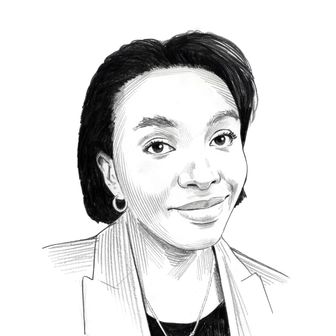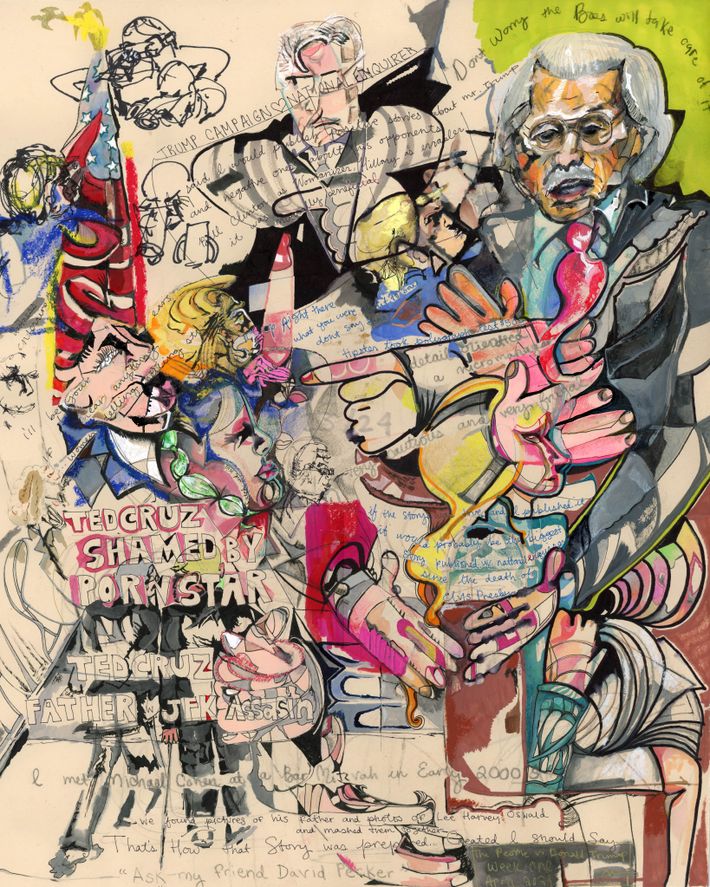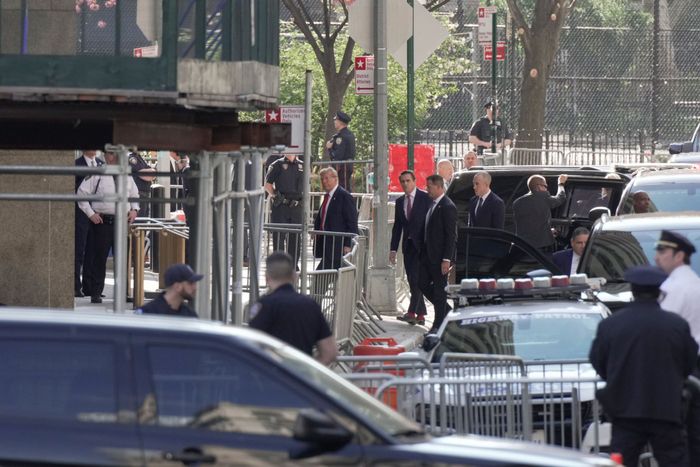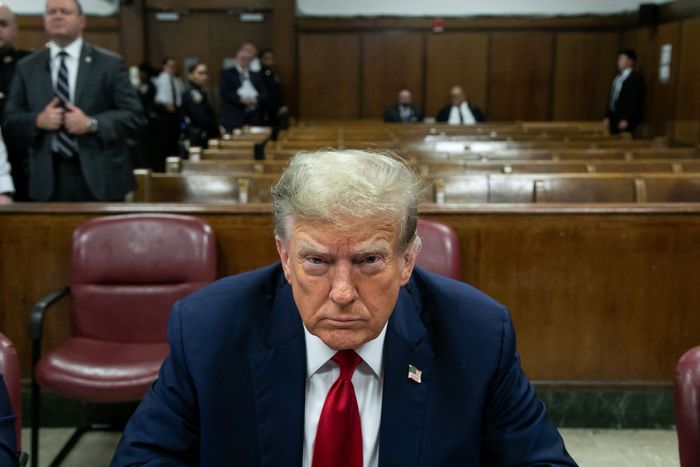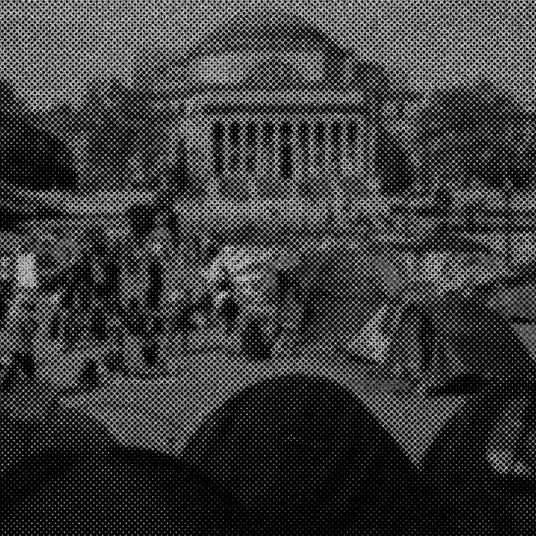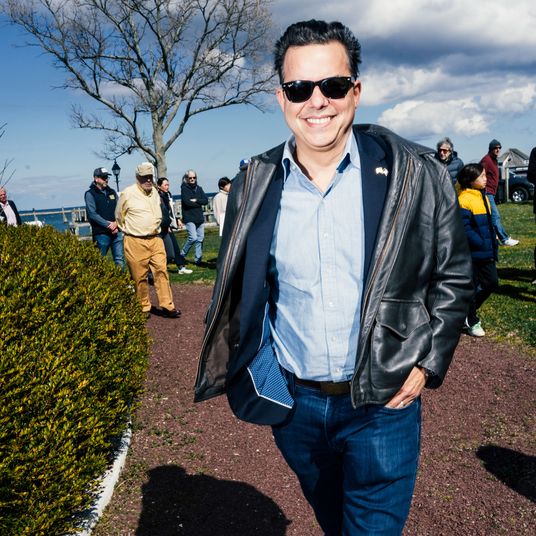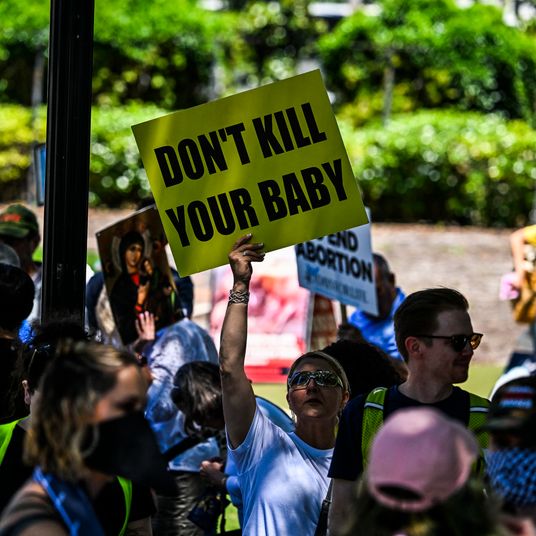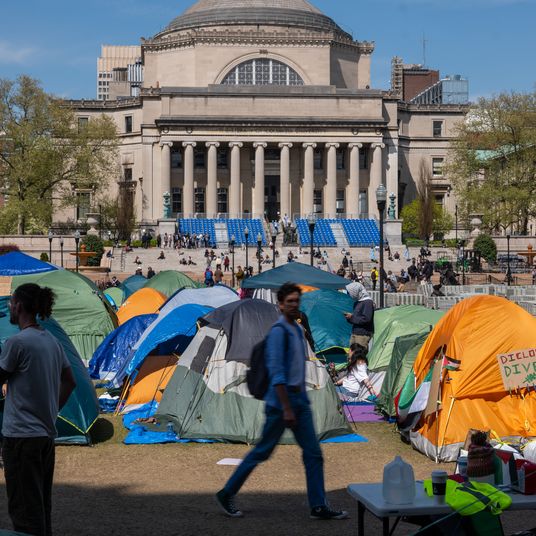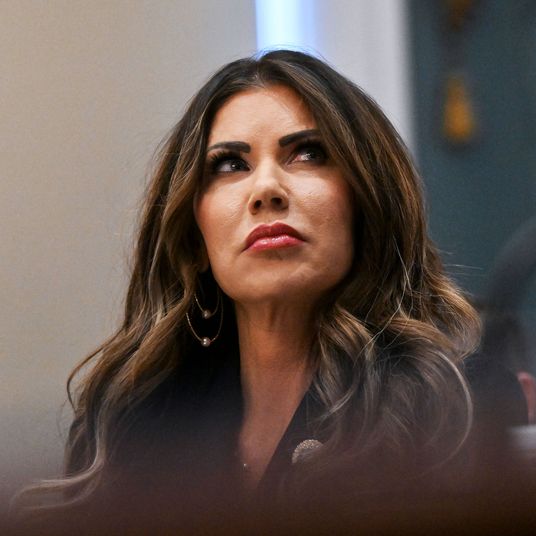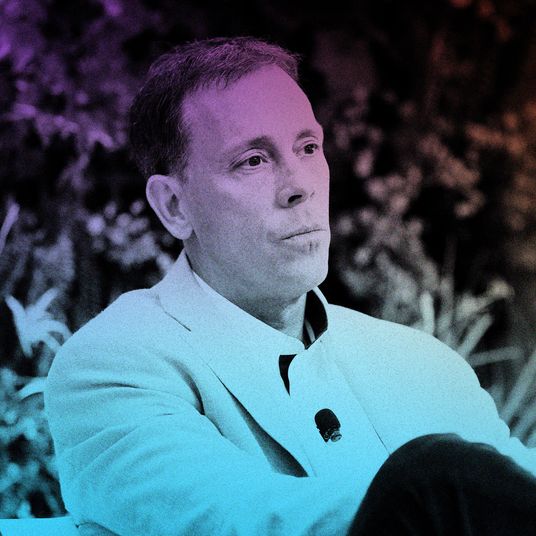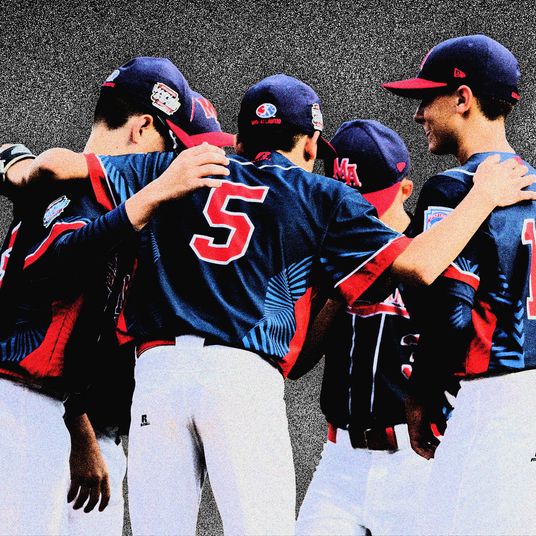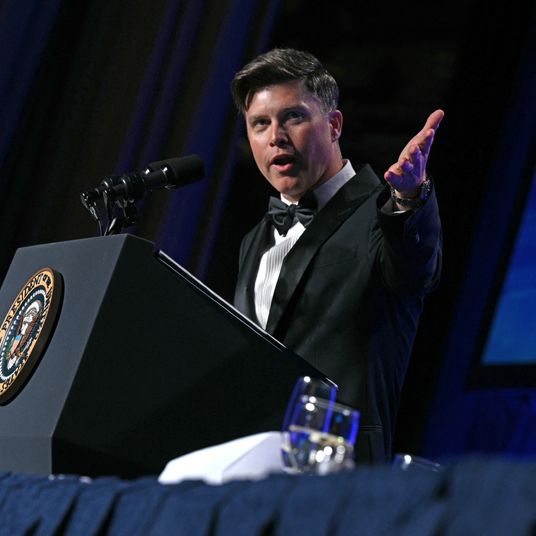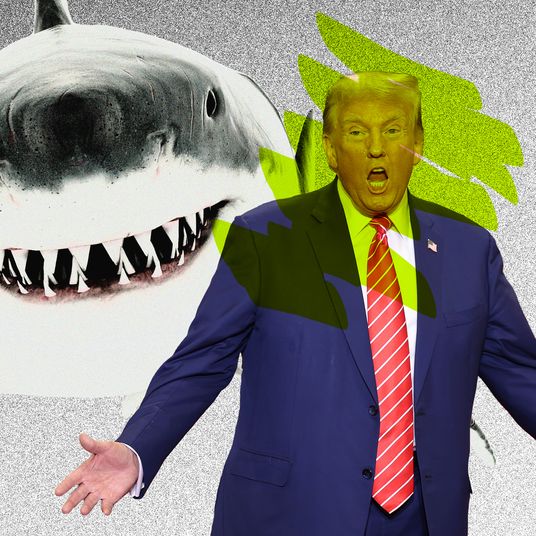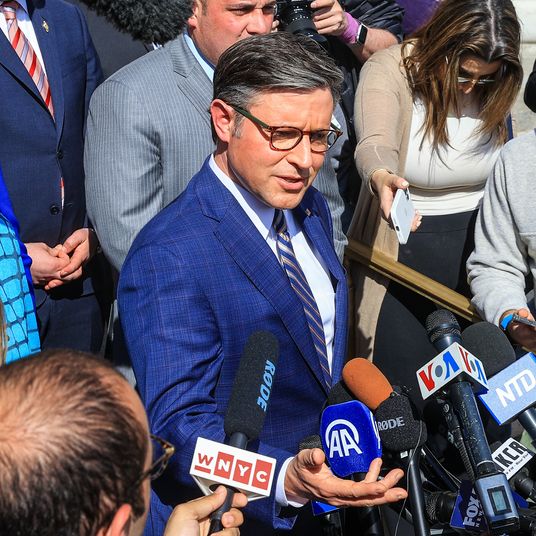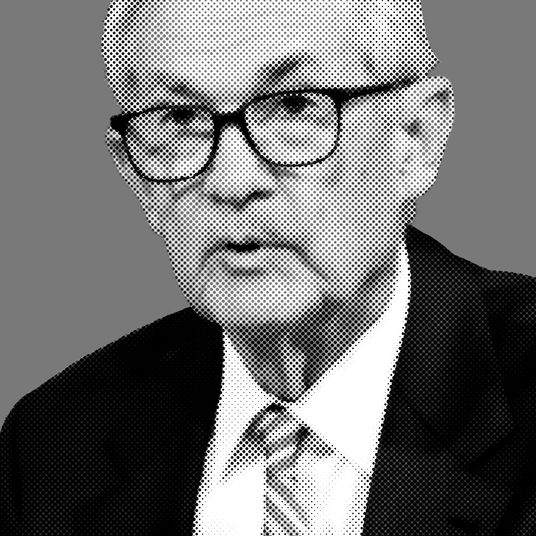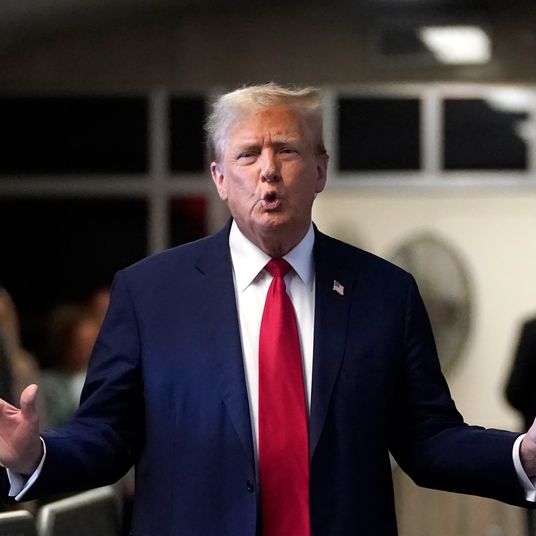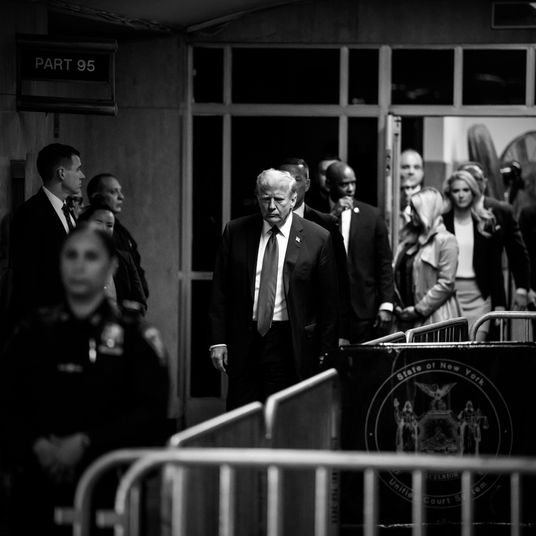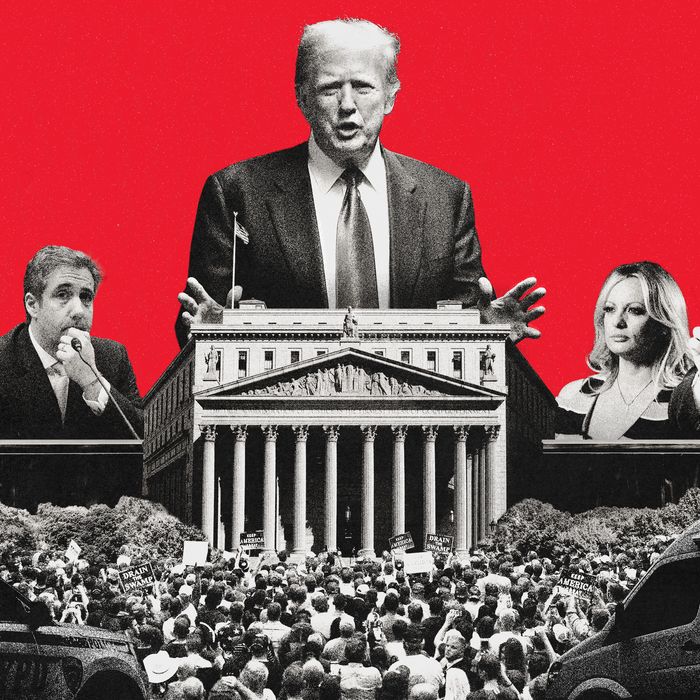
Donald Trump’s first and potentially only criminal trial before Election Day has begun. It’s also the first-ever such trial for a former president, who could be sent to prison if convicted on charges that he broke the law by paying, and subsequently disguising, hush money to Stormy Daniels via his personal lawyer Michael Cohen during the 2016 campaign. (Judge Juan Merchan could punish him in the meantime for contempt of court, such as repeatedly violating a gag order.)
Below is our recap of the untelevised trial, which we’ll update daily with all the important developments and drama. (You can learn more about the key people involved in the trial here.)
Day 9: What to expect
Court resume on Tuesday after a day off on Monday. The prosecution is expected to continue its questioning of banker Gary Farro.
Day 8: Trump’s Attorney Challenges Pecker
On Friday, Trump’s attorney Emil Bove picked up his cross-examination of former National Enquirer publisher David Pecker from where he left off the previous day. After four days on the stand, Pecker finished his testimony. The court then heard from two new witnesses: Trump’s former executive assistant Rhona Graff and banker Gary Farro. Judge Merchan scheduled a hearing on the prosecution’s new gag order violations accusations for next Thursday. His ruling on their first claims has yet to be handed down.
A sketch recap of Day 8
A banker details his connection to Michael Cohen
Gary Farro, a former senior managing director at the now-defunct First Republic Bank, took the stand as the trial’s third witness. Farro testified that Michael Cohen was previously a client of his and that the ex-attorney was assigned to him due to his ability to “to handle individuals that may be a little bit challenging.” He said he returned a call from Cohen in October 2016 about opening a new LLC account. Prosecutor Rebecca Mangold displayed an email from Farro that read, “Need an account opened for Mike Cohen immediately. He wants no address on the checks. Calling you now to discuss.”
The account in question was for Resolution Consultations LLC, which Cohen intended to use to facilitate the payment to McDougal. Farro testified that he believed that Cohen planned to use the account for “real estate.” Documents presented by the prosecution showed that Cohen marked “no” on a form that asked if the LLC concerned political fundraising or a political action committee. Cohen answered similarly on forms for a separate LLC that the former attorney would ultimately use for the Daniels payment: Essential Consultants LLC.
Trump’s former assistant takes the stand
Pecker wrapped up his testimony after four days on the witness stand. The prosecution then called its next witness: Rhona Graff, Trump’s longtime executive assistant. Graff, who is testifying persuant to a subpoena, said that her attorneys are being paid for by the Trump Organization, the company that employed her for 34 years. Graff testified that she recalled seeing Stormy Daniels in the waiting area for Trump’s office in Trump Tower prior to him becoming president. She also confirmed that Trump kept contacts for both Daniels and McDougal.
During her cross-examination, Graff was asked about her time working for Trump. “I never had the same day twice in all that time,” she said “It was a very stimulating, exciting, fascinating place to be.”
Graff also recalled Trump as being a “fair” boss. As she spoke, Trump could be seen smiling. Trump’s attorney Susan Necheles sought to explain Daniels’s visit to Trump Tower, asking Graff if she thought she was there in connection to a possible appearance on Celebrity Apprentice. Graff said she “vaguely” remembers Trump considering Daniels for the show.
After Graff left the stand following her relatively brief testimony, Trump was observed moving towards her and attempting to shake her hand as she left the courtroom.
The prosecution refocuses on the McDougal ‘catch and kill’
In his redirect, prosecutor Joshua Steinglass asked Pecker more questions about the McDougal contract. Previously, Bove tried to suggest that McDougal did benefit from some of the aspects of the agreement and it wasn’t merely packaging for the suppression of her story. Pecker said the added perks of magazine columns and covers were “included in the contract as a disguise.”
Steinglass questioned Pecker on his claim that he had no intentions of publishing McDougal’s story, suggesting that it actually went against the National Enquirer’s interests to do so.
“Had you published a story about a Playboy model having a year-old sexual affair while he was married with a presidential candidate, would that have sold magazines, you think?,” he asked.
“Yes,” said Pecker.
“That would be National Enquirer gold?,” Steinglass said.
Pecker once again agreed.
Steinglass brought up Pecker’s 2018 FBI testimony after court reconvened following a lunch break. Bove suggested in his cross-examination that Pecker contradicted himself on the stand when he said Trump thanked him for handling the McDougal and Trump Tower doorman stories, citing notes from that FBI interview. When asked if he told the FBI that Trump thanked him, Pecker said, “Yes I did.”
Before he wrapped up his redirect, Steinglass asked Pecker if prosecutors ever tried to influence his testimony. He answered no.
Defense continues its cross-examination
On Friday morning, Trump’s attorney Emil Bove picked up his cross-examination of Pecker from where he left off the previous day. Bove raised AMI running negative stories about Bill and Hillary Clinton, asking if they decided to do that prior to the August 2015 meeting between him, Michael Cohen, and Trump. Pecker confirmed that they did, saying it was beneficial for the company. Bove asked the former publisher if AMI ever recycled stories, raising pieces that they published about Trump’s political rivals like Senators Marco Rubio and Ted Cruz. “Yes,” Pecker said.
At one point, Bove referred to Trump as President Trump while questioning Pecker about a 2016 conversation, prompting an objection from prosecutor Joshua Steinglass. “He wasn’t president then!” he said. Merchan sustained. During his opening statement, Bove’s co-counsel Todd Blanche had said his team would call their client President Trump “out of respect for the office that he held from 2017 to 2021.”
Bove also continued a line of questioning from Thursday where he tried to cast doubt on Pecker’s memory of events. He asked if Pecker made an error when he testified that Trump thanked him for his handling of the McDougal and doorman stories.
“Was that a mistake?,” Bove asked.
“No,” Pecker responded.
Bove then raised Pecker’s 2018 testimony to the FBI where he said that Trump expressed no gratitude. “I know what I testified to yesterday and I know what I remember,” Pecker said.
Bove concluded his cross-examination of Pecker before the lunch break and Steinglass stood to begin his redirect.
To testify or not to testify
In the past, Trump has seemed confident that he will ultimately take the stand during his hush money trial. But during a post-court interview on Thursday, he appeared slightly less enthusiatic about the prospect:
Turning up the heat
Trump railed against a new enemy during his typical pre-court remarks: the air conditioning in the courthouse:
For what it’s worth, yesterday’s temperature in the overflow room just down the hall was cool, but manageable.
Day 7: Pecker Gets Into ‘Catch and Kill’ Details
Former National Enquirer publisher David Pecker continued his testimony on Thursday, and the defense began their cross-examination of him.
Taking things in stride
Though the trial will keep Trump largely in New York and away from campaigning across the country, he indicated this morning that he will bring the campaign trail to the city instead.
Prosecution raises Stormy Daniels
After a 20-minute recess, the judge and attorneys discussed various exhibits and whether they should be admitted to the court. Among these was a series of text messages between former National Enquirer editor-in-chief Dylan Howard and an unknown relative. In one text, which will likely not be allowed into evidence, Howard wrote on Election Night 2016, “At least if he wins I will be pardoned for electoral fraud.”
Pecker was asked about adult-film star Stormy Daniels. The former publisher said Howard had called him following the release of the Access Hollywood tape to say that Daniels was shopping around a story about her alleged affair with Trump. The prosecution shared a series of texts between Pecker and Howard. In one exchange regarding Daniels, Howard said, “I know the denials were made in the past- but this story is true.”
Pecker said Michael Cohen wanted him to purchase Daniels’s story, but he was reluctant after the previous payouts he had made on Trump’s behalf. “We’ve already paid $30,000 to the doorman. We paid $150,000 to Karen McDougal. I’m not a bank,” he said. Pecker said he didn’t want to be associated with a porn star, citing his company’s relationship with Walmart.
Pecker was asked about the Wall Street Journal article that broke the news about AMI’s payment to McDougal. When asked why the company had provided a false statement in response to the Journal, denying that it paid for stories, Pecker said, “I wanted to protect my company. I wanted to protect myself. And I also wanted to protect Donald Trump.”
Pecker goes into detail about McDougal
Pecker resumed his testimony from Tuesday, which touched on model McDougal and the deal AMI had struck with her to “catch and kill” her story about an alleged affair with Trump. The former publisher, dressed in a dark suit, white shirt, and red tie, described a three-way phone conversation between himself, Cohen, and Howard about McDougal’s story. Pecker subsequently received a call from Trump in which he encouraged him to buy it. “I believed that the story is true. It would’ve been very embarrassing to himself and to the campaign,” Pecker said on the stand.
AMI negotiated a $150,000 fee in exchange for McDougal to write a health and fitness column and appear on magazine covers. During a later conversation, Cohen said Pecker should pay the fee, which prompted him to ask who would reimburse him. Cohen said, “Don’t worry. The boss will take care of you,” which Pecker said he took to mean that either Trump or the Trump Organization would pay him back. Pecker said he knew Cohen didn’t have the authorization “to buy, to acquire, or spend any money” without Trump’s prior approval. He noted that whenever they went out to lunch together, Pecker always paid. The former publisher also described some hesitancy around the deal owing to a past experience of buying stories on behalf of Arnold Schwarzenegger ahead of his bid for California governor. In one instance, a woman whose story he purchased went to the Los Angeles Times, which later published her story.
When asked why the agreement included all these extra benefits for McDougal when the real goal was acquiring limited life rights, Pecker said he wanted to “substantiate the $150,000 payment.”
‘We committed a campaign violation’
Pecker testified that he and Cohen had discussed letters AMI received in 2018 from the FEC. Worried, Pecker had said to Cohen, “We committed a campaign violation.” He said Cohen replied, “Jeff Sessions is the attorney general, and Donald Trump has him in his pocket.”
Pecker’s cross-examination begins
When Trump attorney Emil Bove cross-examined Pecker, his line of questioning seemed designed to establish that AMI’s “catch and kill” for Trump wasn’t something nefarious or criminal, but just profitable business as usual for the publisher. He asked Pecker about other times AMI used the practice, like for Arnold Schwarzenegger — and Pecker noted a few other bold-faced names, too:
Pecker and Trump sort of exchange pleasantries
The prosecution also asked Pecker if he bore any ill will toward Trump. He responded, “On the contrary. I felt that Donald Trump was my mentor. He helped me throughout my career.” Pecker said that he hasn’t spoken to Trump since 2019 but that “even though we haven’t spoken, I still consider him a friend.” Before court on Thursday morning, Trump called Pecker a “nice guy.”
Prosecution submits more Trump gag-order violations
On Thursday, the prosecution filed a motion alleging that Trump had violated the court’s gag order against him four more times, including with comments he made against Cohen outside the courtroom on Monday and his praise of Pecker on Thursday morning at a campaign event before court:
“It’s a message to everyone involved in these proceedings,” Chris Conroy, one of the prosecutors, said of the motion. Judge Merchan set a hearing for 2:15 p.m. on Wednesday to discuss the additional allegations.
Day 6: A Bad Day for Trump’s Lawyer
Tuesday’s proceedings began at 9:30 a.m. with a hearing on whether Trump violated his gag order, as previously alleged by the prosecution. National Enquirer publisher David Pecker is now continuing his testimony, which began on Monday. Judge Merchan said proceedings would wrap up at 2 p.m.
Pecker returns to the stand
Ex-Enquirer publisher David Pecker returned to the witness stand after briefly beginning his testimony on Monday.
On Tuesday, Pecker was asked about the crucial 2015 meeting with Trump and Cohen at Trump Tower, where he says the two asked him what his magazines could do to help Trump’s presidential campaign. In addition to agreeing to publish positive Trump stories and negative pieces about his rivals, Pecker said he would be Trump’s “eyes and ears” and let Cohen know if he came across anything potentially harmful, particularly regarding women. Pecker told Dylan Howard, the editor-in-chief of the Enquirer at the time, that the agreement between him and the Trump campaign was “highly confidential.” Prosecutors showed examples of some of the unfavorable headlines that the Enquirer ran about Trump’s political opponents, including “BUNGLING SURGEON BEN CARSON LEFT SPONGE IN PATIENT’S BRAIN” and “TED CRUZ SHAMED BY PORN STAR.”
Pecker testified about the $30,000 “catch and kill” agreement his company struck with Trump Tower doorman Dino Sajudin, who tried to sell a story about an alleged love child of Trump’s, confirming that it was the first time he paid to kill a story on Trump’s behalf. He recalls telling Cohen about Sajudin and saying that he thought it was important that the story be “removed from the market.” When asked why he paid so much for the story, Pecker said, “I made the decision to buy the story because of the potential embarrassment it would have to the campaign and Mr. Trump.”
Before court let out for the day, Pecker was asked about model Karen McDougal. He said Howard first told him about McDougal and her alleged affair with Trump and that Howard went out to California to meet her and vet her story. Pecker said, during this time, he would speak to Cohen multiple times a day and that the attorney even asked if they could speak using the encrypted app Signal. He said Cohen seemed agitated and would frequently ask about McDougal. “It looked like he was getting a lot of pressure to get the answer like right away,” Pecker said.
In one bit of potentially damaging testimony, he said he recalled Trump being presented with checks and invoices to sign, which may undercut assertions that the former president did not know about a hush-money scheme.
Trump calls for Merchan’s recusal
During a short break following the hearing, Trump took to Truth Social to rail against Merchan and call for his recusal. “HIGHLY CONFLICTED, TO PUT IT MILDLY, JUDGE JUAN MERCHAN, HAS TAKEN AWAY MY CONSTITUTIONAL RIGHT TO FREE SPEECH. EVERYBODY IS ALLOWED TO TALK AND LIE ABOUT ME, BUT I AM NOT ALLOWED TO DEFEND MYSELF. THIS IS A KANGAROO COURT, AND THE JUDGE SHOULD RECUSE HIMSELF!” he wrote.
Merchan loses patience with Blanche
Tuesday’s scheduled gag-order hearing quickly grew heated when Judge Merchan lost his patience with Trump attorney Todd Blanche as he tried to argue that Trump’s social-media posts did not violate the order. If Trump is found to have violated the gag order, he could be found in contempt and face a $1,000 fine per violation and potentially jail time. Blanche said that there was no “willful violation” of the gag order, that his client was simply responding to political attacks from Daniels and Cohen, and that his words weren’t related to the case. Merchan pushed Blanche for examples of political attacks from Cohen, at one point raising his voice. “I keep asking you over and over again for a specific answer, and I’m not getting an answer,” he said.
Merchan appeared frustrated with Blanche’s answers, saying that he’s “presented nothing” when asked for the specific posts that Trump was responding to. At one point, Merchan said to Blanche, “You’re losing all credibility with the court.” The judge decided to reserve his decision in the matter for now, but the sense in the room is his ruling likely won’t favor Blanche and his client.
Earlier, prosecutor Chris Conroy laid out the ten alleged violations of the gag order made by Trump, saying that his words “pose a very real threat” to the proceedings. Eight of the posts were made on his social-media platform Truth Social, while the remaining two were on his campaign website. He said Trump has gone after potential witnesses like Michael Cohen and Stormy Daniels, whom the ex-president has called “sleazebags,” as well as prospective jurors. Conroy pointed out that a seated juror left the case the day after Trump quoted a TV segment from Fox News’ Jesse Watters, which called potential jurors “undercover liberal activists.” “What happened here is precisely what this order was designed to prevent, and this defendant doesn’t care,” he said.
Day 5: The Trial Begins
Monday’s proceedings included opening statements from attorneys on both sides. The prosecution also called its first witness: David Pecker. Though court was initially slated to end at 2 p.m. in observance of the beginning of Passover, it ended at 12:30 p.m. instead because of a juror’s medical appointment.
New York frees the Trump-trial transcripts
The New York court system announced on Monday afternoon that it would be releasing trial transcripts to the public, amid criticism about the system’s lack of transparency. Per a press release, daily transcripts will be available to view on the court’s website.
‘The People call David Pecker’
The prosecution called its first witness: former Enquirer publisher David Pecker. On the stand, he described his work at the tabloid as “checkbook journalism,” saying that the publication paid for stories and that he had to personally approve any story that cost more than $10,000. Prosecutor Joshua Steinglass asked Pecker about his email addresses and phone numbers, and Pecker confirmed he had a private email account separate from the one he used for work.
Pecker said Dylan Howard, the former editor-in-chief of the Enquirer, reported directly to him. When Steinglass asked Pecker if Howard ran decisions on “juicy stories” by him, he responded, “Yes, he did.”
Pecker and the jury were then dismissed for the day around 12:30 p.m. He’s expected to continue his testimony on Tuesday.
The defense tries to discredit Cohen and Daniels
Trump’s attorney Todd Blanche summed up his team’s argument in the first few sentences of his opening statement. “President Trump is innocent. President Trump did not commit any crimes,” he said. “The Manhattan district attorney’s office should never have brought this case.”
Blanche sought to put distance between Trump and the business records the prosecution alleges he falsified in order to hide the purpose of payments made to Cohen, saying his client had “nothing to do with any of the 34 pieces of paper” aside from signing the checks. “The reality is Mr. Trump is not on the hook — is not criminally responsible for something Mr. Cohen may have done years after the fact,” he said.
He also began to raise doubts about Cohen, who is a highly anticipated witness in the trial, calling him a criminal and suggesting he holds a grudge against his former employer. “He has a goal, an obsession with getting President Trump,” Blanche said. However, when Blanche tried to suggest to the jury that Cohen perjured himself during his testimony in the civil fraud trial last year, the prosecution objected, and Merchan sustained the objection. Prosecutor Matthew Colangelo also objected to an assertion from Blanche that Stormy Daniels’s allegations was an extortion attempt. Merchan sustained that as well.
The prosecution: Trump ‘orchestrated a criminal scheme’
Colangelo began his opening statement by laying out the DA office’s main argument: “The defendant, Donald Trump, orchestrated a criminal scheme to corrupt the 2016 presidential election, then he covered up that criminal conspiracy by lying in New York business records over and over and over again.”
He described a 2015 meeting between Trump, Pecker, and Cohen as the genesis of the agreement between them that Pecker would help to kill negative stories about Trump, run positive ones about him, and publish bad headlines about Trump’s political rivals in the Enquirer. Colangelo raised the Enquirer’s payment to model Karen McDougal over her alleged affair with Trump and said the jury will hear Pecker himself testify about the arrangement.
Colangelo also read Trump’s infamous comments from the Access Hollywood tape, saying his campaign sought to minimize the damage in the run-up to the election, prompting the hush-money payment to Daniels. “It was election fraud, pure and simple,” he said. The prosecutor said that when it became clear that Trump had won on Election Night, Daniels’s lawyer, Keith Davidson, sent a text to Dylan Howard, the editor of the Enquirer, that read, “What have we done?”
Odds and ends to start the day
As the day began, a juror expressed concerns about the level of media attention the case is receiving. Trump was briefly left alone in the courtroom as Merchan and the attorneys for both sides went elsewhere to speak to the juror. Once they returned, Merchan announced that the juror would stay on the panel, adding, “That’s not going to be an issue.”
Next, Merchan announced his Sandoval ruling, which determines what Trump could be cross-examined about if he decides to testify. The judge ruled that the decision in Trump’s civil fraud case could be raised as well as his violations of a gag order in that matter. The prosecution is also allowed to mention the rulings in writer E. Jean Carroll’s successful defamation cases against Trump.
As Merchan instructed the jury, Trump focused his attention on the judge in very Trump-ian fashion, per New York’s Olivia Nuzzi:
A deeper look at Trump lawyer Todd Blanche
In New York’s latest cover story, features writer Andrew Rice took an inside look at Trump’s lead attorney, Todd Blanche, and how his atypical path led him to the one of the biggest trials in American history:
“There are some people who represent Trump who are terrible lawyers,” says Aitan Goelman, a former prosecutor in the Southern District. “There are some people who represent Trump who are terrible people. And Todd is neither of those things.” They first met in the late 1990s when Blanche was a young paralegal who had taken a job in the district’s lower-Manhattan offices. “He was very organized, worked his ass off, he had very good judgment,” recalls Goelman. Before long, he was insisting that Blanche work with him on every trial. Then word got around and everyone started wanting him on their cases too. Blanche was putting in long, intense hours in the courtroom. At night, he was taking classes at Brooklyn Law School.
“I wanted to be a prosecutor so badly,” Blanche told me. The prosecutors at the Southern District were taking on the biggest cases of the time, trying Al Qaeda terrorists and Wall Street fraudsters. The office had a lofty institutional ethos and a reputation as a proving ground for high-powered lawyers. Blanche was self-deprecating about his lack of an Ivy League pedigree. He would joke about it with his colleagues, referring to some of them as “Harvard-Harvards.”
Day 4: The Jury Is Complete
After four days of jury selection, a full jury of 12 jurors and six alternates has officially been seated. Friday’s proceedings began with the goal of selecting five additional alternates from the remaining members of the jury pool, a task that was accomplished by early afternoon. After one last dismissal of a potential juror over anti-Trump social-media posts, five new alternates were sworn in by the court. With the jury set, next week will mark the official beginning of the trial. “We’re going to have opening statements on Monday morning. This trial is starting,” Merchan said.
It’s going to be a long six weeks
Trump was briefly scolded by Judge Merchan before court adjourned for the day. New York’s Olivia Nuzzi set the scene:
A blast from the past
The court proceeded with a scheduled hearing in which both sides discussed which topics are potentially off-limits if Trump testifies (which he says he will).
What followed was a walk down legal memory lane. Emil Bove, one of Trump’s attorneys, argued that the prosecution should not be allowed to mention the hefty judgments levied against Trump in his civil fraud case and in his E. Jean Carroll defamation case. Also under consideration as relevant: a case in which Trump sued his former rival Hillary Clinton. The judge in that matter called the lawsuit “completely frivolous, both factually and legally,” per theNew York Times. Merchan said he’ll determine how to proceed with these matters on Monday.
A self-immolation outside the courtroom
Moments after the full jury had been empaneled, horrific news broke from outside the courtroom: A man had set himself on fire in the designated protest area across the street.
There is no initial word on the victim’s condition or his motive for setting himself on fire.
More from jury selection
Two jurors were dismissed by Merchan early on after saying they wouldn’t be able to be fair and impartial. One juror said her father is a personal friend of former New Jersey governor and frequent Trump critic Chris Christie. Per the Times, Trump smiled “grimly” as she spoke. She also said a relative of potential witness Michael Cohen works at her place of employment, but added that they’ve never worked together. Another prospective juror said that they knew a court officer present at the trial. (When asked about his hobbies, he joked, “I try to find a wife in my spare time. It’s not working.”)
The day grew emotional at times for the everyday people called into this high-profile process. One potential juror was excused after she started crying. “This is so much more stressful than I thought it was going to be,” she said. Another juror was brought to tears as she explained a past conviction in another state. Though her past wouldn’t have prevented her from serving, she was dismissed due to missing paperwork. CNN reports that Merchan thanked the departing juror for sharing her story. “What you just did is something that most people in this courtroom would not be able to do, so thank you,” he said.
Trump sleeps once more
For the third time in four days, Donald Trump seems to have dozed off in the courtroom. Per the New York Times’ Maggie Haberman, “Trump appears to have fallen asleep in court again. It happened several times just now. His eyes were closed for extended periods and his head dropped down twice.”
That’s not what that means
Before Friday’s proceedings began, Trump once again spoke to the assembled media in the hallway outside of the courtroom. He continued to rail against the trial and the gag order placed on him, saying inaccurately that he’s barred from talking to the press.
On social media, Trump posted five times about the need for presidential immunity. In one post, he wrote, “Without Presidential Immunity, the Presidency will lose its power and prestige, and under some Leaders, have no power at all. The Presidency will be consumed by the other Branches of Government. THAT IS NOT WHAT OUR FOUNDERS WANTED!”
Day 3: A Full Jury
In a flurry of activity late Thursday afternoon, Judge Merchan seated several new jurors, upping the number to 12 — a full jury, minus the six alternates that still need to be selected. A brief snapshot of the jurors:
• Juror 1: A man who works in sales and will serve as foreperson.
• Juror 2: A male investment banker who is married with no kids
• Juror 3: A male corporate lawyer
• Juror 4: A married security engineer who is a father of three
• Juror 5: A female middle-school teacher
• Juror 6: A female software engineer
• Juror 7: A male civil litigator and lawyer
• Juror 8: A male retiree who previously worked as a wealth manager
• Juror 9: A female speech therapist
• Juror 10: A male retail employee
• Juror 11: A female apparel company employee
• Juror 12: A female physical therapist
• Alternate 1: A female asset management company analyst
The Times published a detailed look at the men and women who have been chosen to serve on this historic trial.
Judge Merchan also dismissed 48 prospective jurors, who said they couldn’t be impartial, followed by another nine who gave other reasons for opting out. One man, a native of Italy, mentioned that the Italian media frequently compared Trump to the country’s own controversial former prime minister Silvio Berlusconi. He was dismissed. During the direct questioning portion, Trump lawyer Necheles attempted to challenge a juror because of a personal connection: she apparently hosted the juror and her family at her home years prior. Merchan ultimately denied her request. Another juror was questioned about her past social media posts including one that said Trump was “anathema to everything I was taught about love” and described him as racist and sexist. New York’s Olivia Nuzzi was in the room as the woman was required to read her own social-media posts:
The juror apologized to Trump for the tone of those posts, but was later dismissed by Merchan.
Jury Chaos
Earlier on Thursday, the seven jurors who had been selected on Tuesday were whittled down to five. In the morning, Judge Merchan brought in Juror Two for additional questioning after she expressed concerns about her ability to be impartial and said she was worried about information that had been published about her in the media. She said friends and family members showed her posts that seemed to identify her as a juror.
Multiple news outlets homed in on biographical details of the selected jurors including Fox News’ Jesse Watters, who expressed skepticism specifically about Juror Two. Trump later quoted Watters on TruthSocial, writing, “They are catching undercover Liberal Activists lying to the Judge in order to get on the Trump Jury.”
Juror Two was later excused, dropping the total of seated jurors to six. Merchan then asked members of the press to refrain from publishing explicit information about where prospective jurors work.
But then another issue cropped up when prosecutors raised questions about the veracity of one juror’s answers on their questionnaire. According to the New York Times, prosecutors discovered that either Juror Four or someone who shares their name was once arrested for tearing down political ads in the 1990s. Also, the juror’s spouse was once involved in a corruption investigation. If true, these two facts weren’t included in their questionnaire answers. The juror was questioned by the attorneys on both sides and was later excused by Merchan.
The three men and two women who were selected Tuesday and remain on the jury include a civil litigator, a software engineer, and a middle school teacher. Opening statements could begin as early as Monday if the court is able to agree upon 18 jury members — 12 jurors and six alternates — by the end of the week.
Merchan also dismissed 48 prospective jurors who said they couldn’t be impartial, followed by another nine who gave other reasons against serving. Attorneys continued to review the remaining jurors. One man, a native of Italy, mentioned that the Italian media frequently compared Trump to the country’s own controversial former prime minister Silvio Berlusconi. He was dismissed.
Prosecutors call out Trump rhetoric
Prosecutors alleged Thursday that Trump has continued to violate the gag order set on him by Merchan. They named seven new infractions including linking to a New York Post article that calls likely witness Michael Cohen a “serial perjurer,” as well as his quote of Watters’s criticism of the jury-selection process. “It’s ridiculous and it has to stop,” said prosecutor Chris Conroy. Merchan has already scheduled a hearing on the prosecution’s previous gag-order-violation claims for next week.
Take of the day: What Trump sentencing could look like
Norm Eisen, a former White House special counsel for ethics and government reform, considers in a Times op-ed what sentencing might look like for Trump if found guilty:
Justice Merchan would have to wrestle in the middle of an election year with the potential impact of sentencing a former president and current candidate. If Mr. Trump is sentenced to a period of incarceration, the reaction of the American public will likely be as polarized as our divided electorate itself. Yet as some polls suggest — with the caveat that we should always be cautious of polls early in the race posing hypothetical questions — many key swing state voters say they will not vote for a felon.
Day 2: The Few, the Proud, the Impartial
Seven jurors were officially seated after many more were dismissed on Tuesday following doubts about their impartiality and questions about their social media posts about Trump; district attorney Alvin Bragg filed a motion to hold Trump in contempt over an alleged gag-order violation, with a hearing on the matter set for April 23; and Trump appeared to nod off in the courtroom once again.
Signs of progress
The mass draining of the jury pool continued on day two, but unlike on day one, it was not a complete washout: Seven people were eventually selected to serve.
Some prospective jurors were dismissed after expressing concerns that their biases would interfere with serving on the jury. Others cited job responsibilities and previously scheduled events. Another said he had read several of Trump’s books, including The Art of the Deal and How to Get Rich, causing Trump to grin and nod his head excitedly. The afternoon session focused heavily on the potential jurors’ past social-media posts as Trump’s legal team attempted to strike several from serving. In one contentious exchange, a prospective juror was asked to explain a Facebook video that showed people celebrating in the streets after Trump lost the 2020 presidential election. As she spoke about the clip, Trump could be seen gesturing in her direction and muttering, prompting an admonishment from Judge Merchan. “I won’t tolerate that — I will not have any jurors intimidated in this courtroom,” he said. Though Merchan accepted the woman’s explanation, he did go on to dismiss several other jurors. One had previously celebrated Trump’s travel ban being struck down in court and once wrote of Trump, “get him out and lock him up.” Another had shared an AI video of Trump saying “I’m dumb as fuck.”
The jurors so far
Seven jurors were selected by Tuesday afternoon, out of an eventual 18 (including six alternates). Two of that group, however, have since been dimissed:
• A West Harlem man originally from Ireland who works in sales and will serve as foreperson.
• A female oncology nurse who lives on the Upper East Side with her fiancé.
• A male corporate lawyer who lives in Chelsea.
• A Puerto Rican male who has lived on the Lower East Side for four decades and works as an IT consultant.
• A Black female middle-school teacher and Harlem native.
• A female software engineer who lives in Chelsea.
• A male civil litigator and lawyer from the Upper East Side.
Trump is angry that he’s being treated like an average American
In New York, defendants in criminal cases are required to be in court for every day of their trial unless granted a special exception by a judge. Trump has been complaining that Judge Merchan won’t let him skip a day to attend his youngest son Barron’s graduation later this spring. “The Judge, Juan Merchan, is preventing me from proudly attending my son’s Graduation. Seems very unfair, doesn’t it? But this whole event is unfair,” he wrote in one TruthSocial post. In reality, Merchan hasn’t officially ruled on the request but suggested he was open to adjourning that day if the trial goes as planned. “It really depends on how we’re doing on time and where we are in the trial,” he said.
Maybe he’s not a morning person
Law 360’s Frank G. Runyeon reported that Trump nodded off for the second day in a row.
Take of the day: A fair jury is possible
Dr. Julie Blackman, a social psychologist who has worked on several prominent trials as a jury consultant, said in a New York Times op-ed published Monday that the court should be able to put together a fair and impartial jury despite the high-profile nature of the case:
What is likely to unfold in the trial will undoubtedly absorb the jurors’ full attention. Having sworn to the court that they will shelve their preconceptions, the jurors are likely to focus on the evidence and follow it to where it leads. Our brains tend to focus on what’s in front of us, and the evidence in this case surely will be compelling for the jurors.
Day 1: Trump Takes a Nap
On the first day of the trial, Judge Merchan worked to hammer down what would and wouldn’t be allowed in the court proceedings moving forward. Prosecutors from the Manhattan district attorney’s office sought a fine against Trump over a social-media post that called potential witnesses Michael Cohen and Stormy Daniels “sleaze bags.” On his way into the courtroom, Trump railed against the trial, but he dozed off in his chair. And the jury-selection process got underway, but just barely.
Arriving for the “assault on America”
Trump arrived at the courthouse in his motorcade around 9 a.m., stopping in the hallway outside of the courtroom to address reporters. He reiterated his claims that the case against him is unfair and politically motivated, calling it “political persecution” and “an assault on America.”
Access Hollywood is out, McDougal is in
Judge Merchan denied a motion from Trump’s legal team that called for him to recuse himself. He said that Trump was using a “series of inferences, innuendos, and unsupported speculation” to support his recusal claim. He reiterated his earlier decision that the Access Hollywood tape could not be shown in court, deeming it too prejudicial. Prosecutors are also barred from mentioning the numerous sexual-assault allegations against Trump. However, he ruled that Karen McDougal will be allowed to testify, though the prosecution won’t be allowed to mention her claim that her alleged affair with Trump occurred while his wife, Melania, was pregnant with their son, Barron. The prosecution will also be allowed to enter evidence about the National Enquirer’s past coverage of Trump.
Would $1,000 shut him up?
Prosecutors filed a motion, claiming that several of Trump’s social-media posts violated the gag order Merchan set on Trump, which bars him from commenting publicly on potential witnesses, among others — he called Daniels and Cohen “sleaze bags.” Prosecutors are seeking a $1,000 fine per post.
The defense literally rests
The buzz of pretrial hype wasn’t enough to keep the 77-year-old awake. The New York Times’ Maggie Haberman caught Trump appearing to fall asleep at one point during the proceedings, writing, “His head keeps dropping down and his mouth goes slack.”
A jury wasn’t built in a day
96 prospective jurors were brought into the courtroom to kick off the jury-selection process, but more than half were quickly sent home after stating they couldn’t be impartial or were unable to serve. By the end of the day’s proceedings, Merchan had only gotten through the questionnaires of nine jurors, and none have been selected for the final panel. The novelty of possibly sitting on this particular jury wasn’t lost on these Manhattanites, some of whom were seen craning their heads to sneak a peek at the defendant. One juror was excused owing to a potential conflict with his son’s wedding in June, prompting congratulations from Merchan. Another who listed clubbing among her hobbies was dismissed after acknowledging she had “strong opinions or firmly held beliefs” about Trump. Another potential juror said his girlfriend worked in finance but admitted that he didn’t know what she did, sparking laughter from the prosecutors. A second group of prospective jurors will get their shot on Tuesday.
The photo of the day
Behold the dour glowerer-in-chief:
When MAGA comes to Manhattan
A kidnapped-Biden truck drove in circles outside court on Monday morning:
How the Jury Will Be selected
Like any other trial, this one begins with the process of selecting a jury, which could take several days. Attorneys for the defense and prosecution will question a large pool of Manhattan residents until they find 12 jurors and six alternates. Judge Merchan drafted a 42-question-long survey for prospective jurors to fill out in order to determine their impartiality. In addition to personal questions, potential jurors are asked about their media diets, whether they’ve volunteered for Trump’s campaign or attended a rally, and if they’ve ever read any books or listened to any podcasts by Michael Cohen, a key witness for prosecutors, or Mark Pomerantz, the attorney who previously worked on the DA’s investigation into Trump. It also asks whether they have been a member of several extremist groups and movements, such as the Proud Boys and antifa.
Merchan previously ruled that jurors will be anonymous and have their identities shielded from the public owing to the risk of “a likelihood of bribery, jury tampering, or of physical injury or harassment.” Trump, his attorneys, and prosecutors will have access to the jurors’ names and addresses.
This post has been updated.
More on the Trump trial
- Trump Had a Good Day in One Court
- Trump Is Furious He Got Caught Sleeping in Court
- A Porn-Star Payoff or a Threat to Democracy?


